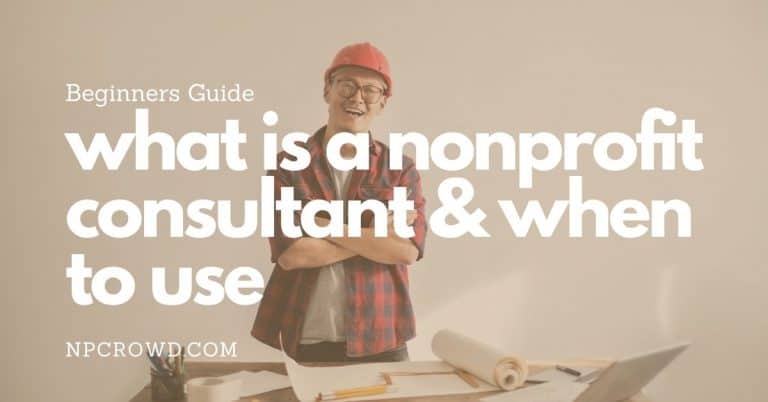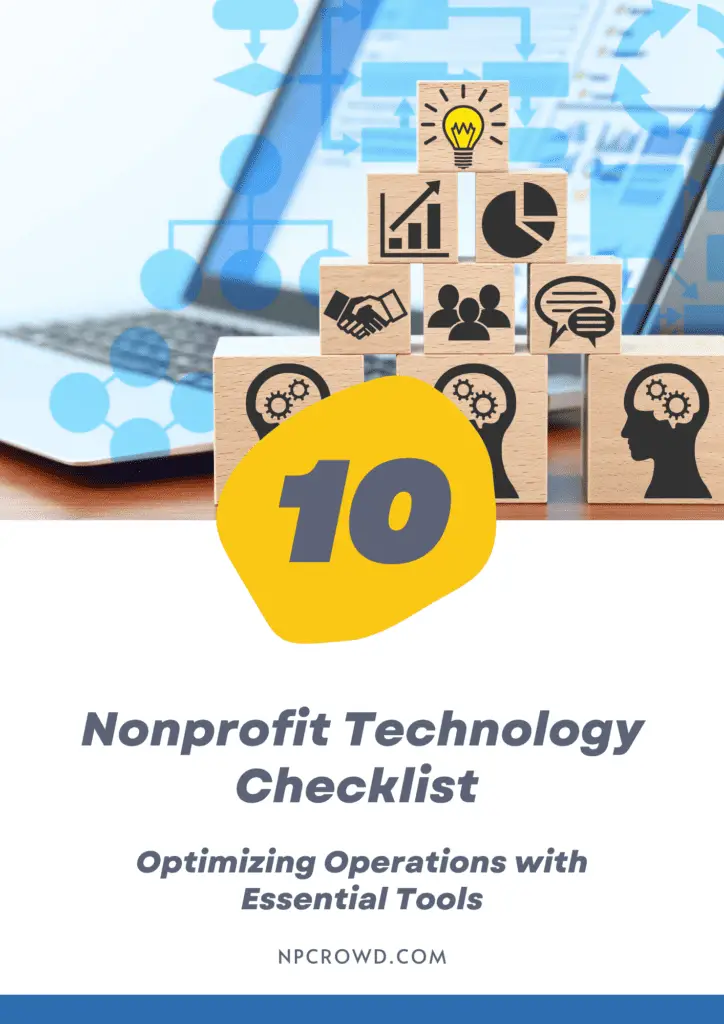Strategic Planning Consultants for Nonprofits
Disclaimer: This post may contain affiliate links. These links, if used and purchases made, we may earn a small commission. These affiliate programs do not impact the recommendations we make or the resources we refer you to. Our focus is on providing you the best resources for your nonprofit journey.
A nonprofit strategic planning consultant is a professional who specializes in helping nonprofit organizations develop and implement strategic plans. They work closely with nonprofit leaders and stakeholders to assess the organization’s current situation, identify goals and objectives, and create a roadmap for achieving those goals. In this article, we will explore the importance of strategic planning for nonprofits, the benefits of hiring strategic planning consultants, key steps in the strategic planning process, how to choose the right consultant, and common challenges in strategic planning for nonprofits.Key Takeaways
- Nonprofit strategic planning consultants help organizations develop and implement strategic plans to achieve their goals.
- They conduct comprehensive organizational assessments to identify strengths, weaknesses, and opportunities for growth.
- Consultants facilitate stakeholder engagement to ensure that diverse perspectives are considered in the planning process.
- They have expertise in nonprofit management, governance, fundraising, and evaluation.
- Nonprofit strategic planning consultants face challenges such as navigating complex organizational structures and balancing short-term and long-term goals.
What is Strategic Planning?

Understanding the Basics
Strategic planning is an intentional process that helps organizations set a clear direction and make informed decisions to achieve their goals. It involves assessing the current situation, defining goals and objectives, developing strategies and tactics, and implementing and evaluating the plan. Transparency and collaboration are key elements of strategic planning, as they ensure that all stakeholders are involved and aligned. By engaging in strategic planning, nonprofits can effectively navigate challenges, capitalize on opportunities, and achieve long-term success.
Why is it Important for Nonprofits?
Strategic planning is a crucial process for nonprofit organizations as it provides a roadmap for achieving long-term objectives and maximizing impact. It allows nonprofits to align their resources effectively, engage stakeholders, and adapt to a changing environment. By defining the organization’s mission, vision, goals, and strategies, strategic planning consultants help nonprofits stay focused and make informed decisions. They bring expertise in nonprofit management, governance, and fundraising, and assist organizations in navigating complex structures and stakeholder expectations.
Benefits of Hiring Strategic Planning Consultants

Expertise and Experience
A strategic planning consultant brings specialized knowledge and experience in nonprofit strategic planning. They have worked with various organizations and can offer valuable insights and best practices. With their expertise, they can guide your organization in developing a strategic plan that aligns with your goals and objectives. Their experience allows them to understand the unique challenges and opportunities that nonprofits face, and they can provide tailored solutions to address them.
Consultants have a deep understanding of the nonprofit sector and are familiar with the latest trends and strategies. They stay updated on industry developments and can provide innovative approaches to enhance your organization’s results. By leveraging their expertise and experience, you can gain a competitive advantage and achieve long-term success.
Objective Perspective
Consultants provide an unbiased and objective perspective on your organization’s strengths, weaknesses, opportunities, and threats. They can identify areas for improvement and help you develop a strategic plan that aligns with your goals.
Efficiency and Focus: Strategic planning consultants have the expertise to streamline the planning process and keep it focused. They can guide you through each step, ensuring that your resources and efforts are directed towards achieving your organizational goals.
Stakeholder Engagement: Consultants facilitate stakeholder engagement,
Customized Approach
A key advantage of hiring strategic planning consultants is their ability to provide customized solutions. Consultants will work closely with your organization to understand its unique needs and challenges, and they will develop a strategic plan tailored to your specific goals, mission, and resources. This personalized approach ensures that the strategic plan aligns with your organization’s vision and maximizes its chances of success.
Key Steps in the Strategic Planning Process

Assessing the Current Situation
When working as a strategic planning consultant, one of the key responsibilities is conducting a comprehensive organizational assessment. This assessment involves evaluating various aspects of the organization, such as its mission, goals, programs, operations, and resources. By conducting a thorough assessment, consultants can gain a deep understanding of the organization’s strengths, weaknesses, opportunities, and threats.
To conduct an organizational assessment, consultants may use a combination of qualitative and quantitative methods. This can include reviewing documents and data, conducting interviews and surveys, and observing organizational processes. The goal is to gather information that will inform the development of a strategic plan.
Here are some key steps involved in conducting a comprehensive organizational assessment:
- Reviewing the organization’s mission, vision, and values to ensure alignment with its goals and objectives.
- Analyzing the organization’s internal and external environment, including factors such as competition, funding sources, and regulatory requirements.
- Assessing the organization’s programs and services to determine their effectiveness and impact.
- Evaluating the organization’s financial health and sustainability.
- Identifying the organization’s strengths, weaknesses, opportunities, and threats.
It is important for consultants to approach the assessment process with objectivity and sensitivity. They should create a safe and supportive environment for stakeholders to share their perspectives and experiences. By doing so, consultants can gather valuable insights and ensure that the assessment accurately reflects the organization’s current situation.
Setting Goals and Objectives
To effectively implement the strategic plan, it is important to build flexibility into the plan. This allows the organization to adapt and respond to changing circumstances and emerging opportunities. Regular communication and transparency are also crucial during the implementation phase. Sharing the strategic plan with stakeholders helps build trust and achieve their goals.
Managing Stakeholder Expectations
Managing stakeholder expectations is a critical aspect of the nonprofit strategic planning process. When embarking on strategic planning, it is important to engage with key stakeholders to ensure their perspectives are heard and considered. This inclusive approach allows for a valuable strategic plan that addresses current and emerging needs, as well as known and unplanned barriers. Additionally, using data to inform decision-making provides a solid foundation for setting goals and expectations. By aligning on the objectives, deliverables, and desired outcomes, nonprofit organizations can establish a successful partnership with a strategic planning consultant. Clear communication and a well-defined hiring process are essential in ensuring a smooth and effective consultant selection process. This increases the likelihood of finding the right consultant who can meet the organization’s needs and help manage stakeholder expectations.
Best Practices for Nonprofit Strategic Planning Consultants
Building Strong Relationships with stakeholders is key to successful strategic planning for nonprofits. Consultants should prioritize open and honest communication, actively listening to the needs and concerns of stakeholders. This helps build trust and ensures that the strategic plan reflects the organization’s mission and vision. Additionally, consultants should bring expertise and experience in the nonprofit sector, understanding the unique challenges and opportunities nonprofits face. Collaborating with stakeholders throughout the planning process and providing ongoing support and guidance can lead to a more effective and sustainable strategic plan.
In summary, setting goals and objectives is a crucial step in the strategic planning process for nonprofits. It requires flexibility, transparency, and effective communication with stakeholders. By following best practices and engaging with a strategic planning consultant, nonprofits can develop a strategic plan that aligns with their mission, addresses current and emerging needs, and sets them up for success.
Developing Strategies and Tactics
Developing strategies and tactics is a critical part of the strategic planning process for nonprofits. Once the organization has assessed its current situation and set goals and objectives, it’s time to determine the specific actions and approaches that will be used to achieve those goals. This involves brainstorming and analyzing different options, considering the organization’s resources and capabilities, and identifying the most effective strategies to pursue. It’s important to involve key stakeholders in this process to ensure their buy-in and to benefit from their diverse perspectives and expertise.
One approach to developing strategies and tactics is to conduct a SWOT analysis, which stands for strengths, weaknesses, opportunities, and threats. This analysis helps identify the internal strengths and weaknesses of the organization, as well as the external opportunities and threats it faces. By understanding these factors, the organization can develop strategies that leverage its strengths, address its weaknesses, take advantage of opportunities, and mitigate threats.
Another important consideration when developing strategies and tactics is to prioritize and focus on the most impactful initiatives. Nonprofits often have limited resources, so it’s crucial to allocate those resources strategically. This may involve identifying quick wins that can generate momentum and support for the organization, while also investing in initiatives that contribute to long-term sustainability and growth. It’s also important to align short-term actions with long-term objectives, ensuring that day-to-day activities are in line with the overall strategic direction of the organization.
In summary, developing strategies and tactics is a key step in the strategic planning process for nonprofits. It involves brainstorming and analyzing different options, conducting a SWOT analysis, prioritizing initiatives, and aligning actions with long-term objectives. By involving key stakeholders and considering the organization’s resources and capabilities, nonprofits can develop effective strategies to achieve their goals and make a positive impact in their communities.
Implementation and Evaluation
Once the strategic plan has been implemented, it is crucial for nonprofits to evaluate its effectiveness and make any necessary adjustments. Evaluation allows organizations to assess the outcomes of their programs and initiatives, identify areas for improvement, and measure the impact they are making. Nonprofit strategic planning consultants play a key role in this process, helping organizations develop clear evaluation frameworks and methodologies that align with their goals and objectives. They collect and analyze relevant data, engage stakeholders to ensure diverse perspectives, and use evaluation findings to inform decision-making and drive continuous improvement.
When selecting a nonprofit strategic planning consultant, it is important to consider their experience and expertise in evaluation and impact measurement. Look for consultants who have a track record of using data-driven approaches to inform strategic decision-making and enhance program effectiveness.
Choosing the Right Strategic Planning Consultant

Industry Knowledge and Expertise
When it comes to choosing a strategic planning consultant for your nonprofit organization, industry knowledge and expertise are crucial. Nonprofit organizations operate in a unique environment with specific challenges and opportunities. A consultant with deep understanding of the nonprofit sector can provide valuable insights and guidance tailored to your organization’s needs. They are familiar with the intricacies of nonprofit organizational structures, hierarchies, and decision-making processes, allowing them to navigate these complexities effectively. Additionally, they have experience managing diverse stakeholders, including board members, staff, volunteers, donors, and community members, who may have different expectations and priorities. By engaging and aligning these stakeholders, a consultant with industry knowledge and expertise can help drive the strategic planning process towards success.
Proven Track Record
When it comes to choosing the right strategic planning consultant for your nonprofit organization, one of the key factors to consider is their proven track record. A consultant with a proven track record demonstrates their expertise and success in helping nonprofits develop effective strategic plans.
A consultant’s track record can be evaluated by looking at their past clients and the outcomes they have achieved. Look for consultants who have worked with organizations similar to yours and have helped them achieve their goals.
Additionally, consider the consultant’s experience in the nonprofit sector. Nonprofits have unique challenges and requirements, so it’s important to work with someone who understands the specific needs of nonprofit organizations.
By choosing a consultant with a proven track record, you can have confidence in their ability to guide your organization through the strategic planning process and help you achieve your desired outcomes.
Collaborative Approach
A collaborative approach is essential in strategic planning for nonprofits. By involving all relevant parties in the planning process, you foster buy-in and increase the likelihood of successful plan implementation. This ensures that the strategic plan reflects the diverse perspectives and interests of stakeholders, creating a sense of ownership and commitment. The consultant will work closely with your organization to understand its unique needs and challenges, developing a strategic plan tailored to your specific goals, mission, and resources. This personalized approach ensures that the plan is aligned with your organization’s vision and values.
Common Challenges in Strategic Planning for Nonprofits

Limited Resources
Limited resources can be a significant challenge for nonprofits, but it doesn’t have to hinder your organization’s growth and impact. With my extensive experience in fundraising and resource development, I can help you make the most of the resources you have.
Here are some strategies to optimize your limited resources:
- Prioritize: Identify the areas that require the most attention and allocate resources accordingly. Focus on initiatives that align with your mission and have the potential for high impact.
- Collaborate: Seek partnerships and collaborations with other organizations or individuals who share your goals. Pooling resources and expertise can amplify your impact.
- Leverage Technology: Explore technology solutions that can streamline processes and automate tasks, freeing up time and resources for more strategic initiatives.
Remember, limited resources shouldn’t discourage you. With the right approach and guidance, you can achieve remarkable results and create lasting change.
Resistance to Change
Resistance to change is a common challenge that nonprofits face when implementing strategic planning initiatives. It is natural for individuals and organizations to feel hesitant or resistant to change, as it often disrupts established routines and processes. However, embracing change is crucial for nonprofits to adapt to evolving external factors and achieve their goals.
One important tip for addressing resistance to change is to communicate the benefits and rationale behind the strategic planning process. By clearly explaining how the organization will benefit from the changes and involving stakeholders in the decision-making process, you can help alleviate concerns and build buy-in.
Another effective strategy is to provide training and support to staff members during the transition period. This can include workshops, coaching sessions, and resources to help employees understand and navigate the changes. By investing in their development and addressing their concerns, you can empower them to embrace the new strategies and contribute to the success of the strategic planning process.
Remember, change can be challenging, but it is necessary for nonprofits to thrive in today’s dynamic environment. By addressing resistance to change head-on and implementing strategies to support staff members, you can create a culture of adaptability and innovation within your organization.
Lack of Alignment
One of the common challenges in strategic planning for nonprofits is the lack of alignment. Nonprofit organizations often have multiple stakeholders, including board members, staff, volunteers, and donors, each with their own perspectives and priorities. This can lead to conflicting goals and strategies, making it difficult to create a cohesive and unified strategic plan.
To address this challenge, it is important for nonprofits to foster open and transparent communication among stakeholders. This includes regular meetings and discussions to ensure everyone is on the same page and working towards a common vision. Additionally, establishing clear decision-making processes and involving all relevant stakeholders in the planning process can help ensure alignment and buy-in.
Key Highlight: conflicting goals and strategies
Frequently Asked Questions
What is the role of a nonprofit strategic planning consultant?
A nonprofit strategic planning consultant helps organizations develop and implement strategic plans to achieve their goals. They conduct comprehensive organizational assessments, facilitate stakeholder engagement, and provide guidance and support throughout the planning process.
What expertise does a nonprofit strategic planning consultant have?
A nonprofit strategic planning consultant has expertise in nonprofit management, governance, fundraising, and evaluation. They understand the unique challenges and dynamics of the nonprofit sector and can navigate complex organizational structures.
Why should a nonprofit hire a strategic planning consultant?
A nonprofit should hire a strategic planning consultant to benefit from their expertise, objectivity, efficiency, stakeholder engagement, and customized solutions. Consultants bring a fresh perspective, facilitate collaboration, and help organizations make informed decisions.
What are the key responsibilities of a nonprofit strategic planning consultant?
The key responsibilities of a nonprofit strategic planning consultant include conducting a comprehensive organizational assessment, identifying goals and objectives, creating a strategic plan, and facilitating implementation and evaluation.
What are the common challenges faced by nonprofit strategic planning consultants?
Nonprofit strategic planning consultants face challenges such as navigating complex organizational structures, managing stakeholder expectations, adapting to changing external factors, and balancing short-term and long-term goals.
What qualifications should a nonprofit strategic planning consultant have?
A nonprofit strategic planning consultant should have expertise in nonprofit management and governance, experience in data-driven decision-making, excellent communication and collaboration skills, and a proven track record in strategic planning.







